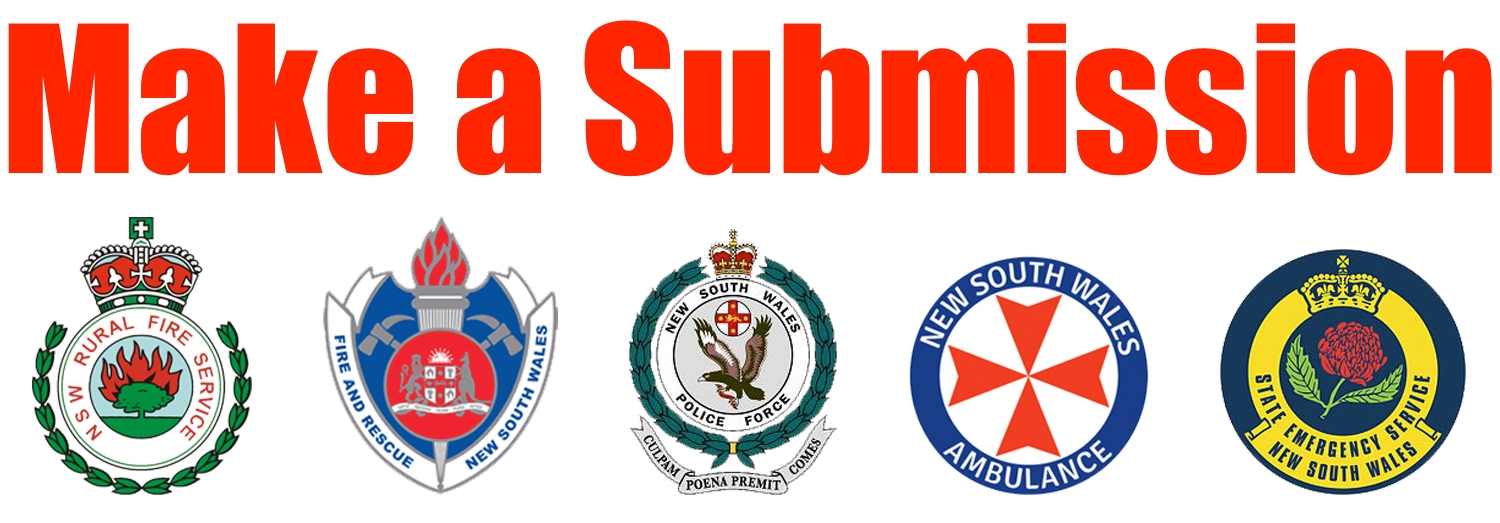
Submissions close on the 23rd July 2017
Terms of Reference
The Legislative Council, Portfolio Committee No. 4 – Legal Affairs will inquire into and report on emergency services agencies, and in particular:
a) The prevalence of bullying, harassment and discrimination, as well as the effectiveness of the protocols and procedures in place to manage and resolve such complaints within emergency services agencies, including:
- New South Wales Rural Fire Service
- Fire and Rescue New South Wales
- New South Wales Police Force
- Ambulance Service of New South Wales
- New South Wales State Emergency Service
b) The support structures in place to assist victims of workplace bullying, harassment and/ or discrimination within emergency services agencies,
c) The support services available to emergency services workers and volunteers to assist with mental health issues resulting from workplace trauma and the effectiveness of those programs
d) The appropriateness of uniforms provided to personnel in emergency services agencies
e) The relocation of the New South Wales Rural Fire Services Headquarters to Orange, Dubbo or Parkes
f) Any other related matter.
Committee Membership
Hon Robert Borsak MLC – Shooters, Fishers and Farmers Party (Chair)
Mr David Shoebridge MLC – The Greens (Deputy Chair)
Hon David Clarke MLC – Liberal Party
Hon Catherine Cusack MLC – Liberal Party
Hon Trevor Khan MLC – The Nationals
Hon Shaoquett Moselmane MLC – Australian Labor Party
Hon Lynda Voltz MLC – Australian Labor Party
Guide to Writing Submissions
Calling for written submissions is one of the most important ways that parliamentary committees gather evidence. Any person or organisation can make a submission to a committee.
Submissions alert committee members to information relevant to an inquiry. Committee reports refer to and quote from the information and arguments presented in submissions. Submissions also inform members about how you, your organisation, or your community feel about an issue. They may also help members decide who should be called to give evidence at committee hearings.
Drafting a Submission
There is no set format for a written submission. You can write a brief letter or a substantial research paper. You can also attach appendices and other supporting documents.
Your submission must be relevant to the terms of reference. The terms of reference describe the subject of the inquiry and set the boundaries. You only need to address those issues that are relevant to you.
You may wish to use the terms of reference as headings to provide a clear structure to your submission.
If your submission does not address the terms of reference the committee may not accept it as evidence.
In drafting your submission, you may wish to include the information set out below.
Key Issues
Identify the key problems or issues that need to be addressed.
Evidence
Refer to relevant research, laws, policies or findings. The committee wants to be informed by expert opinion.
Case Studies
Include examples of how you, your organisation or your clients are affected by the issue. The committee wants to know about the human side of a policy and its effects (you may want to consider removing identifying information).
Recommendations
Try to identify possible solutions. The committee wants to know what can be done to address a problem.
Summary
Provide a brief summary and a contents list, if your submission is lengthy and includes several recommendations.
Please also include page numbers so the committee can accurately reference your submission in the report.
Sending your Submission
The committee prefers submissions to be provided electronically through the website. Otherwise, you can send your submission by email, post or fax. Contact details can be found on each inquiry’s webpage.
Remember to keep a copy of your submission. You may find it useful if you are called to give evidence.
Include your Details
Please ensure that your name, address and phone number are included with your submission. Your personal contact details will not be published with your submission.
If you are making a submission on behalf of an organisation, please indicate who has authorised it, for example, the executive committee, president or chairperson.
Publishing Submissions
A committee may decide to publish some or all of the submissions received. Public submissions are usually available on our website.
If you want all or some of your submission to be kept confidential, you must state that clearly in your submission. The committee will consider your request. Wherever possible, the committee will try to publish submissions so that they can be used as evidence in writing the report and forming recommendations.
Parliamentary Privilege
Committees are an extension of the Parliament. A committee’s proceedings, including the making of submissions and oral evidence given by witnesses, are protected by parliamentary privilege. This means that evidence can be given freely and honestly without fear or threat of legal action for defamation. At the same time, parliamentary privilege should not be abused so be cautious about including adverse comments about individuals in your submission. Comments made outside a submission do not receive the protection of parliamentary privilege.
Submissions become committee documents and are confidential until the committee decides to make them public. Anyone who republishes a committee document apart from the Parliament or its committees is subject to the laws of defamation. You should not distribute copies of your submission without the committee’s permission.
Further Information
You can find contact details, submissions, hearing schedules, transcripts, committee reports and other information on our website at www.parliament.nsw.gov.au/committees. From here you can navigate to specific committees and inquiries. If you need help finding information, please contact the committee staff.
